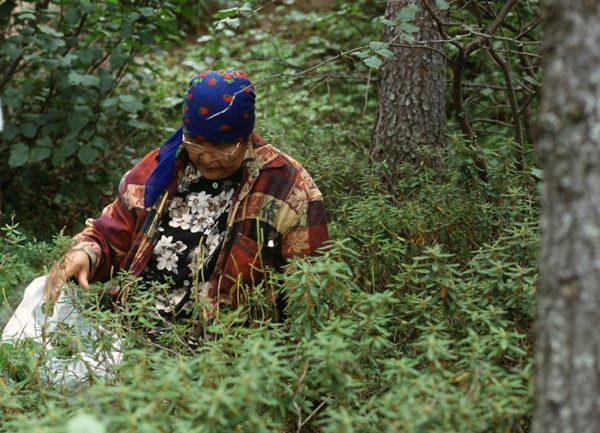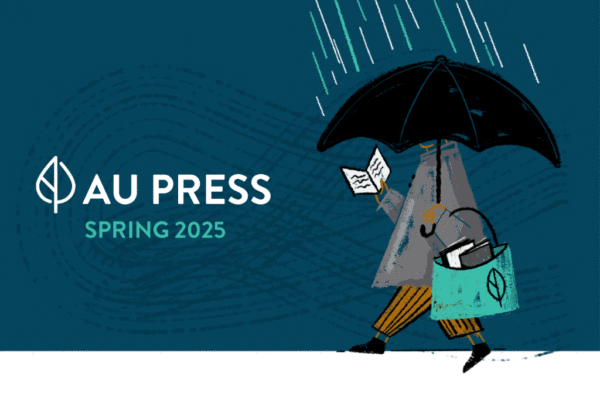Living on the Land: Indigenous Women’s Understanding of Place edited by Nathalie Kermoal and Isabel Altamirano-Jiménez brings together Indigenous women scholars to discuss the marginalization of the knowledge traditionally held and produced by Indigenous women. From a variety of methodological perspectives, contributors explore the nature and scope of Indigenous women’s knowledge, its rootedness in relationships, both human and spiritual, and its inseparability from land and landscape. This collection focuses on the integral role of women as stewards of the land and governors of the community and points to a distinctive set of challenges and possibilities for Indigenous women and their communities.
For this week’s #AUPBookOfTheWeek, we’re sharing one- or two-sentence quotes from Living on the Land. These quotes coalesce into a beautiful summary of the book.
Chapter 1: “Distortion and Healing: Finding Balance and a “Good Mind” Through the Rearticulation of Sky Woman’s Journey” by Kahente Horn-Miller
“I went to the edge of the platform created by the birds’ wings and peered over the edge. Far below, my eyes were met with brilliant blue. The blue was from a great expanse of water reflecting the sunlight, and it was both beautiful and almost too much to bear. There appeared to be no land. I wondered to myself, where I would stand in this world?”
Chapter 2: “Double Consciousness and Nehiyawak (Cree) Perspectives: Reclaiming Indigenous Women’s Knowledge” by Shalene Jobin
“The sense of “two-ness,” of an internal struggle between two warring selves, is one of the devastating effects of racial prejudice and systemic injustices.”
Chapter 3: “Naskapi Women: Words, Narratives, and Knowledge” by Carole Lévesque, Denise Geoffroy, and Geneviève Polèse
“Knowledge is always conditioned by the ways that human beings behave both individually and in groups, and knowledge thus continually serves to create social links and social cohesion.”
Chapter 4:” Mapping, Knowledge, and Gender in the Atlantic Coast of Nicaragua” by Isabel Altamirano-Jiménez and Leanna Parker
“Indigenous peoples have developed their knowledge systems not only by living on the physical land but by establishing social and spiritual relationships with place and with the beings that inhabit it.”
Chapter 5: “Métis Women’s Environmental Knowledge and the Recognition of Métis Rights” by Nathalie Kermoal
“This knowledge belongs to the future as well as to the past: the elders often emphasized that traditional knowledge, while rooted in ancient stories and oral histories, is current, contemporary, and sustainable.”
Chapter 6: “Community-Based Research and Métis Women’s Knowledge in Northwestern Saskatchewan” by Kathy L. Hodgson-Smith and Nathalie Kermoal
“Territorial integrity is an essential part of maintaining control over the conservation of species and habitats. Respect for territory is crucial to keeping encroaching species out and limiting the capacity of individual families to have negative impacts on species populations. The family territory becomes an essential identifier, provides a sense of belonging and responsibility and cultural identity.”
Chapter 7: “Gender and the Social Dimensions of Changing Caribou Populations in the Western Arctic” by Brenda Parlee and Kristine Wray
“By listening to the voices of women, we aim to arrive at a richer understanding of the social dimensions of caribou population change in the western Arctic. More specifically, we examine questions of agency. What role do women play in the comings and goings of caribou?”
Chapter 8: “’This Is the Life’: Women’s Role in Food Provisioning in Paulatuuq, Northwest Territories” by Zoe Todd
“Again and again, those to whom I spoke emphasized the importance of family and of bringing children out onto the land. Such occasions reaffirm relationships, while also creating memories that are essential to both personal and collective identity. They also serve as a reminder of those who are no longer able to be present, thereby forging a sense of connection across time. ”
![[book cover] Living on the Land](https://www.aupress.ca/app/uploads/120256_Living-on-the-Land-cover.jpg)
You can download Living on the Land for free on our website. You can also get 20% off the print book until 31 May 2020 by entering the code CabinFever when you order through our distributor, UBC Press.


